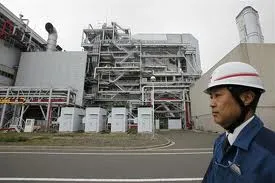
Japan's thermal plants unstable
Fears of problems at thermal plants resulting in sudden blackouts have prompted the Japanese government to prepare for rolling power cuts.
This will be implemented on areas serviced by Kansai, Kyushu, Hokkaido and Shikoku electric power companies, based on a government draft of power savings targets for this summer.
Kansai Electric is expected to face the biggest shortage.
With all Japan's nuclear reactors currently shut down and no immediate plans to restart them, power companies have fired up thermal plants.
The government's draft hints at an attempt to win understanding fromlocal bodies and electricity consumers for the restarting of the No. 3 and 4 reactors at KEPCO's Oi Nuclear Power Plant in Fukui Prefecture by shoving the risk of rolling power cuts in front of them.
It has been forecast that if Japan faces a scorching summer this year like that of 2010, then the electricity supply from the Kansai, Kyushu, and Hokkaido electric power companies will fall between 1.9 and 14.9 percent short of demand during peak consumption periods.
Shikoku Electric Power Co. would barely meet electricity demand. Accordingly, areas serviced by the four companies are being asked to make major power savings of between 5 and 15 percent.
According to calculations, if the power cuts are implemented as planned, and other electric power companies pitch in to boost supply, then the four power companies will just manage to make it through the summer. But the threat of glitches looms over thermal power plants that are running at full steam in place of Japan's nuclear plants, as there is a possibility that restarting power plants which were due to be dismantled or shut down for inspectionscould result in sudden breakdowns.
In February this year, operations at Kyushu Electric Power Co.'s Shin-Oita thermal power station in the city of Oita, which has a generating capacity of about 2.3 million kilowatts, suddenly came to a halt. The company averted a major blackout in its service areas by receiving electricity from KEPCO and other power companies.
The government says that Kyushu, Hokkaido and Shikoku rely heavily on major thermal power plants with generating capacities of between 700,000 and 1 million kilowatts. If one of them were to stop, electricity supply would immediately fall by between 5 and 12 percent.
Rolling power cuts in the wake of the outbreak of the Fukushima nuclear crisis triggered by the March 2011 quake and tsunami have resulted in more companies moving operations overseas, and if more planned power cuts are implemented, then it could slow down the recovery of the economy.
On May 10, the government announced preliminary figures indicating that the shortage of electricity would be practically resolved if the Oi reactors were restarted. Then on May 14, it indicated that there was a risk of rolling power cuts over a wide area if the reactors were not restarted.
For more, click here.








![Cross Domain [Manu + SBR + ABF + ABR + FMCG + HBR + ]](https://cmg-qa.s3.ap-southeast-1.amazonaws.com/s3fs-public/styles/exclusive_featured_article/public/2025-01/earth-3537401_1920_4.jpg.webp?itok=WaRpTJwE)
![Cross Domain [SBR + ABR]](https://cmg-qa.s3.ap-southeast-1.amazonaws.com/s3fs-public/styles/exclusive_featured_article/public/2025-01/pexels-jahoo-867092-2_1.jpg.webp?itok=o7MUL1oO)









 Advertise
Advertise


